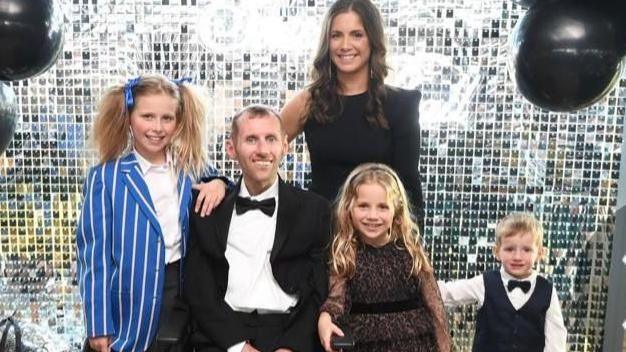Major landmark lit up blue and orange for MND

Tom came up with the idea to light up the bridge after his brother's diagnosis
- Published
The brother of man who died from motor neurone disease (MND) said he hoped lighting up a major landmark would help raise awareness of the "cruel disease".
Tom, from Merseyside, came up with the idea to light up the Mersey Gateway Bridge after his brother died from MND last year aged 31.
The bridge was lit up blue and orange on Friday night to mark global motor neurone disease awareness day.
Tom said he had never heard of the disease before his brother was diagnosed and said if one person was curious and searched for what the colours meant it was "a win".

The bridge was lit up to raise awareness
Rob was 24 when he was diagnosed an given two years to live.
"He was just a normal lad," Tom said.
"He wanted to go to university and study computer programming and design games.
"Even when he had MND he was still designing games even when he could barely move the mouse to click and code with.
Tom said his brother had been doing a beginners course at his archery club when he noticed a weakness in his right arm and the movement in his thumb was affected.
'Cruel disease'
"He went to the doctors and it took about 10 months until he finally got a diagnosis," he said.
"He was a fighter even to the end.
"I don't think I ever heard him complain once about him living with MND.
"He was never concerned about himself. He was only concerned about other people.
"Even during his end of life care when he tried to speak it was always to ask about someone else and to make sure someone else in the room was OK because we were all upset and he was worried about us."
Tom said he wanted to raise awareness of the disease and came up with the idea of lighting up the landmark and contacted the Mersey Gateway Bridge.
"When Rob was diagnosed I had never heard of MND," he said.
"I thought well if I can get this giant landmark lit up, even if one person is curious and wonders why it's blue and orange and searches for it and discovers what MND is, then it's a win.
"It needs more awareness it needs more funding it's a really cruel and horrible disease."
Listen to the best of BBC Radio Merseyside on Sounds and follow BBC Merseyside on Facebook, external, X, external, and Instagram, external. You can also send story ideas to northwest.newsonline@bbc.co.uk, external
Related topics
More like this story
- Published21 June 2024

- Published24 January 2024

- Published21 June 2024
